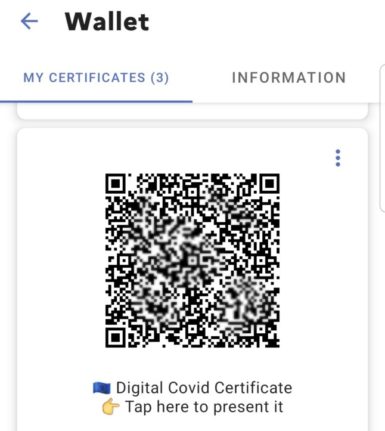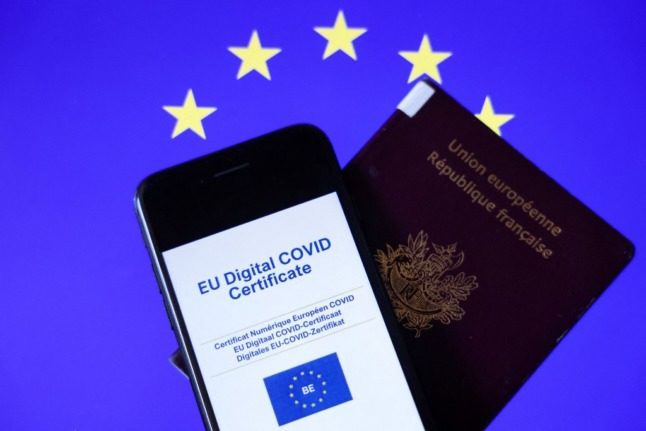It was announced on Friday that travel vaccination certificates are now available – but what is the EU Covid certificate and how different is it from the French pass sanitaire?
Vous voyagez cet été ? Le certificat européen de vaccination #Covid_19 est dès à présent disponible ! Rendez-vous https://t.co/pqcIA8HJKL pour le télécharger 👍 pic.twitter.com/AGqyBndTxc
— Vite Ma Dose de Vaccin ! (@ViteMaDose_off) June 25, 2021
First of all, obviously you need to have been vaccinated.
Anyone who has completed their vaccination course in France should have an attestation de vaccination (vaccination certificate) with a QR code on it. People more recently vaccinated were given these at their appointment, others can download them via the Ameli site.
READ ALSO How to create an Ameli account
If you don’t have one of these certificates, here is what to do.
Once you have the certificate, you can then either print it out or scan it into the French TousAntiCovid app and this creates the pass sanitaire which since June 9th has been needed to access large events such as concerts and festivals in France.
So what about travel?
From Friday, June 25th, a new certificate is available and it’s this one that you need if you want to travel.
If you are vaccinated after June 25th your certificate will be EU-compliant, if you got yours earlier then you need to update it to ensure it can be scanned at the border.
For those who have an Ameli account this is pretty easy – head to attestation-vaccin.ameli.fr and log in with details from your Ameli account.
This should display a certificate entitled EU Digital Covid certificate, with your name and DOB and a QR code which you can download.
If you don’t have a smartphone, you can print out the certificate to show at the border.
If you do have a smartphone, open up the TousAntiCovid app and go to the My Wallet section and scan in the code.
If should then appear with any other certificates – vaccine certificates or test results – that you have uploaded. The one for travel has the little EU emoji next to it.
If you have previously scanned in a vaccination certificate to the app, there should be an option to update it to the EU one in the app – open up the My wallet section of the app and find your certificate. If you tap on the three blue dots just above the QR code to the left, you will get an option to ‘convert to European format’ which will update your code.

For people who do not have an Ameli account, the advice it to take your current vaccination certificate to a vaccine centre, doctor or pharmacy and ask for the EU-compliant version. This does not need t be the centre where you were vaccinated.
A free telephone hotline is available between 9am and 8pm daily for anyone who has trouble downloading or using the health passport. The number is: 0 800 08 71 48
When can I use this?
Officially the EU’s Covid-19 certificate, as it’s properly known, launches across the bloc on July 1st.
From that date, people who can show they are fully vaccinated (ie two weeks after their second dose or four weeks after the single dose Johnson & Johnson vaccine) can travel anywhere within the EU or Schengen zone without needing to follow certain health measures, such as quarantining or testing.
Slightly confusingly, some nations already accept it. On Thursday, June 24th, Norway eased regulations to allow visitors from 12 EU countries to travel using the EU Covid certificate. For the rest, it will be available from July 1st.
Do I have to?
It is important to note that it is not a requirement for travel within the Bloc. But those who do not carry it will have to abide by any local Covid-19 laws in place for countries that they visit, including quarantine periods. They may also need to take tests to enter certain countries.
The certificate is intended to make such requirements unnecessary for holders.
The EU pass will be valid in: Germany, Austria, Belgium, Bulgaria, Cyprus, Croatia, Denmark, Spain, Estonia, Finland, France, Greece, Hungary, Ireland, Italy, Latvia, Lithuania, Luxembourg, Netherlands , Poland, Portugal, Czech Republic, Romania, United Kingdom, Slovakia, Slovenia, Sweden, as well as Switzerland, Iceland, Liechtenstein, Norway.
At present only vaccination certificates can be uploaded, but it is intended that by July this is extended to also create EU-compliant codes for negative Covid tests and certificates of recent recovery.
What if I was vaccinated outside France?
The French app at present only accepts French certificates but for travel purposes a vaccination certificate from any EU or Schengen zone nation will be accepted at the border.
The situation for people vaccinated in non EU countries is, at present, less clear.



 Please whitelist us to continue reading.
Please whitelist us to continue reading.
Hello,
I just read your article about the EU-Wide Covid Vaccination Passport and have a question.
I have been vaccinated and have my French document with the QR Code for France. I do not have an amelie.fr account so what would be the best way to obtain the EU-Wide document?
Thank You Bruce Maliner
My wife and I are also fully vaccinated in France and we have the QR codes as well as the TousAntiCovid app.
Our amelie.fr accounts are not yet active, so we will be interested to know if, when and how we can use the EU Digital Covid Certificate.
Thanks for keeping us informed and up to date,
John P Charles
I was vaccinated in the U.K. as stuck there early this year, I have an NHS certificate but registered under Ameli as live in France for most of the year with a CdS. The consulate announced that France recognises NHS certificates so I sent it to Ameli with lot numbers and dates plus the QR code requesting it be registered as vaccinated on my ameli records. I have heard nothing back. I am not unique in this situation as many many Brits have family ties still in the U.K. but spend most of their time in France. Whether this is going to be lost in the realms of bureaucracy I do not know but I do not see the point of being vaccinated twice again to satisfy a paper trail. This is a gap that needs to be closed.
Does that mean with my French Vaccinated Covid App that I can visit the UK after July 1st without having to isolate?
Another website is reporting that there will be a converter on the TousAntiCovid app next week
I had my first jab in Spain and my second in France because the Spanish cancelled my second jab. It was astraZeneca and they ran out of it! They declared they would be giving it at around 4/5 months are the first jab. No point in that at all! I have had a home in France for 26 years but was never allowed to be resident as my husband worked in the UK, but I am in the medical system. I have a home in Spain too and am now resident there, no problem. Now I have a certificate from Spain for the first jab and a certificate from France with a QR code for the second, but it says one jab and then completed. (termine). I am worried this will present problems and like the person above do not think I should have to “over-vaccinate” to be able to get a proper vaccine passport, not to mention needlessly deprive another person of a vaccination possibility. Furthermore I still haven’t even been contacted re the second jab in Spain. My Spanish friends are in the same position and very stressed, not being able to do what I decided to do. My GP in Spain is horrified by the Spanish authorities playing with people’s health. What a mess…
I don’t have a carte vitale. I just tried two pharmacies with mixed results. The first pharmacy told me that I could get my QR code converted to the EU version, but I needed to return to my vaccination center. The second pharmacy told me that they did not know how to help me without a carte vitale. Therefore, I think the process has not been well articulated to the pharmacies on how to help people without a carte vitale.
Like David my wife and I were stuck in the UK for almost a year as I was diagnosed with cancer, as were were there we got our Covid 19 jabs I have mine on NHS App my wife has hers on a certificate, we are now back in France, we are registered with Amelie, how would we be able to register for the Vaccination passport?
This article is so very helpful. Thank you!
Please let everyone know that if you have a covid vaccination certificate issued in France, it can be converted to an EU certificate directly within the TousAntiCovid app.
I don’t seem to have that option on my iPhone.
For some reason the iPhone app never got an update. You have to de-activate the app, delete it, then download it again. When you rescan your QR code you will then see the option to convert it to the EU version in the upper right corner.
Thanks. The app is now updated and the certificate has been converted.
Thank you. Yes, in the updated version, there is a tiny blue button just to the upper-right of the original QR code inside the wallet. The option allows you to “convert to EU format.”